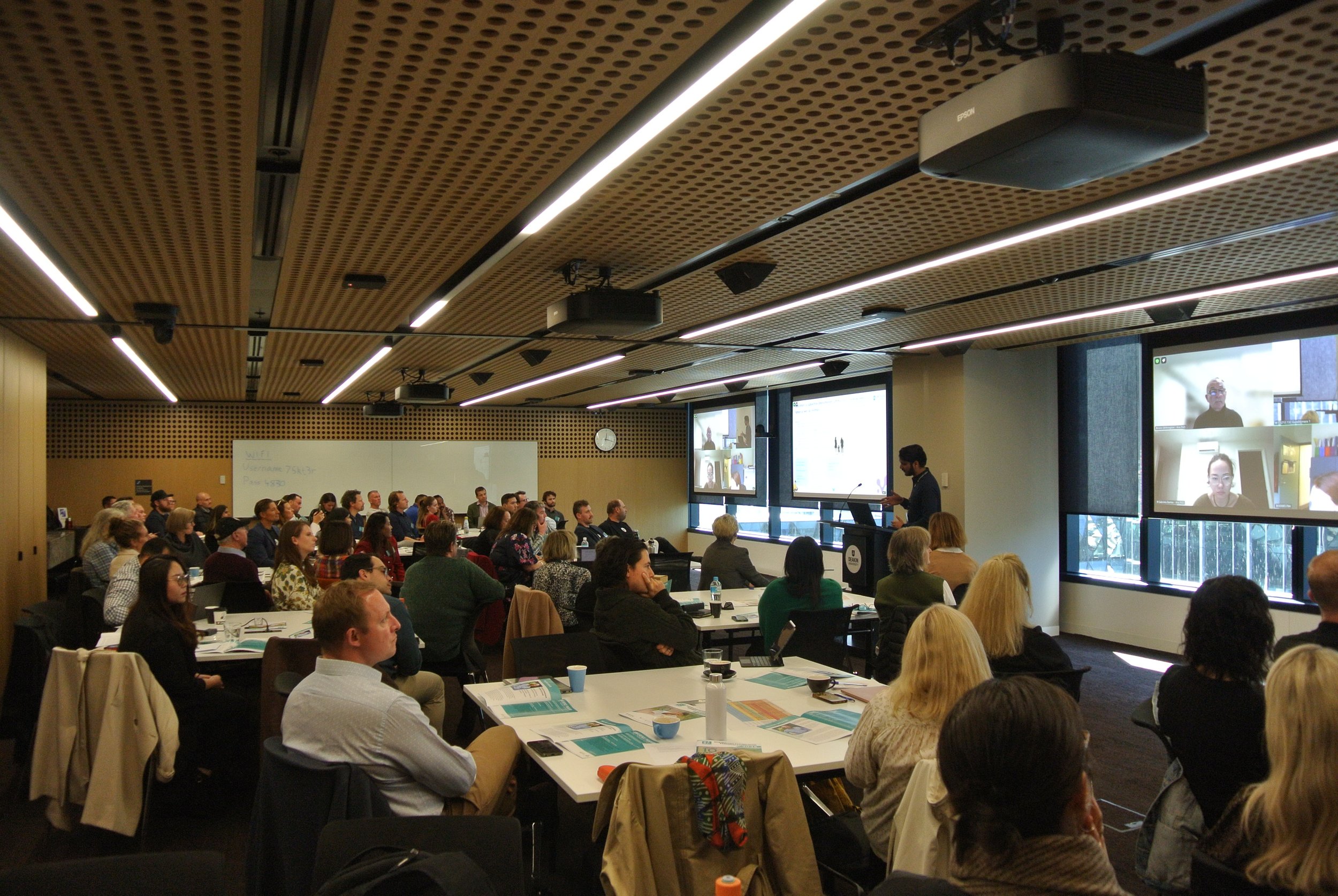
AFRC Publications
The AFRC working groups work towards advancing fatherhood research and publishing their findings in peer-reviewed journals to inform practice and future research. The first domain of enquiry was fatherhood and sleep, specifically associations between fathers’ sleep and mental health. Three publications have already emerged from this body of work.
Peer-reviewed Publications
-
How are you sleeping? Starting the conversation with fathers about their mental health in the early parenting years (2021)
This research paper was conducted by the AFRC Data and Analysis Group and led by Jacqui Macdonald.
Background
Approximately 1 in 10 fathers of infants experience symptoms of common mental health disorders, prompting calls for paternal postpartum screening. However, numerous obstacles exist to screening implementation. The aim of this study was to provide preliminary evidence for an alternative approach that starts with asking fathers about their sleep.
Methods
Using self-reported father data at 0 to 36 months postpartum (N=1204) from four Australian cohort studies, we assessed associations between responses to various single-item questions about sleep (good to poor), and scores on validated measures of mental health (depression, anxiety and stress). We conducted regressions, unadjusted and adjusted for father age, child age, household income, education, first or later child, and marital status, to test associations between sleep and each indicator of mental health. We then meta-analyzed effects and assessed interactions between sleep and each of the covariates.
Results
Consistent associations between fathers’ subjective poor sleep and depression, anxiety and stress were replicated across the four cohorts despite heterogeneity in the sleep questions. At the meta-analytic level, effects ranged from weak to moderate (0.25 to 0.37) and were robust to all adjustments. Interactions were only detected between family income and poor sleep, such that the association was stronger for high income fathers.
Limitations
This study does not address the sensitivity or specificity of single-item sleep questions for assessing paternal mental health risk.
Conclusions
A low-cost, non-stigmatizing single question to postpartum fathers about their sleep may present a gateway opportunity to enquiring about mental health.
-
Sleep, mental health and wellbeing among fathers of infants up to one year postpartum: A scoping review (2020)
This review was conducted by the AFRC Literature Review Group and led by Karen Wynter.
Background
Sleep disturbance among adults has consequences for their health and functioning. Among mothers of infants, there is evidence that fatigue and sleep disturbance are significantly associated with depression, anxiety and impaired relationships with partners and infants. It is not known whether consistent evidence of such associations exists for fathers.
Purpose
The aim of this review was to describe what is known about fathers’ sleep and its associations with mental health and wellbeing, in the first 12 months postpartum.
Methods
A scoping review was conducted, searching MEDLINE complete, Scopus, PsycINFO and CINAHL complete, from 1990 to 13 May 2019. Reference lists of relevant reviews were also searched. Articles were included if they were published in English, and reported on sleep among men cohabiting with their infants from birth to 12 months.
Findings
Thirty papers reporting on 27 separate studies met inclusion criteria. Sleep constructs and assessment of these varied greatly. While some measures of fathers’ sleep improved, fathers’ fatigue increased significantly with increasing infant age. In adjusted analyses, fathers’ sleep problems were associated with poorer mental health, relationships with partners, and safety compliance at work.
Key conclusions
Health professionals should consider a brief assessment of fathers’ sleep when they consult families with young infants. Psycho-education regarding management of poor infant sleep could help to prevent long-term fatigue and its consequences among fathers.
-
Preconception factors associated with postnatal mental health and suicidality among first-time fathers: results from an Australian Longitudinal Study of Men’s Health (2023)
This research paper was conducted by the AFRC Data and Analysis Group and led by Rebecca Giallo.
Purpose
Prospective evidence about men at risk of postnatal difficulties is rare–particularly for postpartum suicidal ideation. This study aimed to determine the extent to which first-time fathers reported depressive symptoms and suicidal ideation and behaviours in the first postnatal year, and to identify preconception risk factors for postnatal mental health difficulties.
Methods
Secondary analysis of data from The Ten to Men Study–Australia’s population-based prospective study of men’s health was conducted. Participants were 205 men who became first-time fathers in the 12 months prior to wave 2 (2015/16). Regression analyses were used to ascertain preconception (mental and physical health, lifestyle) and demographic factors associated with postnatal depressive symptoms.
Results
Postnatally, 8.3% of fathers reported moderate to severe depressive symptoms, 5% had suicidal thoughts, 3% had plans, and less than 1% had attempted suicide. Preconception depressive symptoms was the only factor significantly associated with postnatal depressive symptoms.
Conclusion
The transition into fatherhood is marked with significant psychological distress for some men. These results suggest that mental health screening and support in the preconception period is crucial to supporting the mental health of new fathers.
-
Effectiveness of Father-Focused Interventions to Prevent or Reduce Intimate Partner Violence During Pregnancy and Early Parenthood: A Systematic Review (2024)
This review was conducted by the AFRC Literature Review Group and led by Karen Wynter.
During pregnancy and the early parenting period, women are especially vulnerable to intimate partner violence (IPV), with devastating impacts on women, children, and families. The aim of this systematic review was to determine the effectiveness of father-focused interventions to prevent or reduce IPV during pregnancy and early parenthood.
Six databases were searched, using a combination of the concepts “fathers,” “pregnancy/early parenthood,” “IPV” and “intervention.” Articles were double screened by title and abstract, and then full-text. Methodological and reporting quality was assessed using the Quality Assessment with Diverse Studies tool. Fifteen papers were eligible for inclusion; these articles were mostly of poor-to-moderate quality. Only three of the articles reported on interventions in lower- and middle-income countries. The most common forms of IPV addressed in these interventions were physical (10), psychological (8), sexual (4), and economic/financial (3). Of 12 articles reporting on data from both intervention and control groups, only six indicated statistically significant results; among these, only three reported robust analyses showing significantly greater reduction in IPV in intervention than in control groups. All three took place in lower- or middle-income countries. Two were underpinned by theoretical frameworks, which considered transforming traditional perceived gender norms.
Therefore, interventions based on principles that address transformation of gender norms show promise but the success of such underlying principles needs to be confirmed, and better-quality evidence and reporting are needed for interventions targeting fathers to prevent or reduce IPV.
Investigations
in progress
-
Investigation in progress, led by Associate Professor Nyanda McBride of the AFRC Literature Review Group.
-
Investigation in progress, led by Dr. Jennifer StGeorge of the AFRC Data and Analysis Group.
-
Investigation in progress, led by Dr. Levita D’Souza of the AFRC Informing Interventions Group.
The Fatherhood Bulletin
The Fatherhood Bulletin gives dads a voice to convey their experiences of fathering and provides information about up to date research on fathers’ wellbeing and on their role in their children’s and partners’ lives.
Browse past issues and subscribe below!
Symposium Programs
The AFRC produces programs for the annual Australian Fatherhood Research Symposium.
Explore past programs below!
Connect with the AFRC
Keep up to date with future AFRC publications by following with us on social media!


